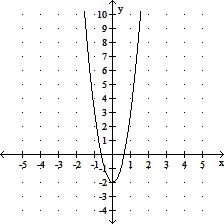Add or subtract, if possible. Assume that all variables represent non-negative values. Simplify your answer. 19 - 4
- 4
A. 19 - 4
- 4
B. 3
C. -3
D. 15
Answer: B
You might also like to view...
Find the formula for df-1/dx.f(x) = (4 - x)3
A. -3(4 - x)2
B. 4 - x1/3
C. x2/3
D. - 
Determine the coefficient and the degree of each term in the polynomial.-3x4 - 15x2 + 5x + 4x6
A. Coefficients: -3, -15, -5, -4 degrees: 4, 2, 1, 6 B. Coefficients: -3, -15, 5, 4 degrees: 4, 2, 0, 6 C. Coefficients: -3, -15, 5, 4 degrees: 4, 2, 1, 6 D. Coefficients: 4, 2, 1, 6 degrees: -3, -15, 5, 4
Express the vector in the form v = v = v1i + v2j + v3k.7u - 2v if u =  and v =
and v = 
A. v = 1i + 7j - 2k B. v = 1i + 9j - 2k C. v = 13i + 7j - 2k D. v = 7i + 7j - 2k
Use the graph of f to determine the intervals where f is increasing and where f is decreasing.
A. incr: x ? 0; decr: x ? 0 B. decr: all x C. incr: x ? 0; decr: x ? 0 D. incr: all x